
West Liberty University Biology Professor Dr. Joseph Horzempa has received half a million dollars in grants to continue his studies on a unique bacterium as a vaccine host. Horzempa received $250,000 from the National Institutes of Health and an additional $250,000 from WV-INBRE (Idea Network of Biomedical Research Excellence).
“The grants will allow me and my students to progress in our study of Francisella tularensis with the hope of learning more about its use with vaccines,” Horzempa said.
The red-blood-cell invading bacterium, Francisella tularensis, is highly infectious. Fewer than 10 inhaled bacteria causing the fatal disease tularemia. The Centers for Disease Control and Prevention has classified it as a biodefense agent because of its possible use in bioterrorism. Besides the threat of intentional release, it causes a variety of naturally occurring human infections that can be acquired by inhalation, insect bites, exposure or contact.
Yet, in two-year grants, Dr. Horzempa is studying a modified version of the bacterium, weakened to the point it is not dangerous, as a way to deliver live vaccines.
“Patients immunized with this organism show a very long-term memory response — over 30 years post vaccination,” he says. “Based on the fact that this is such a potent vaccine, we propose to use this organism as a novel vaccine platform,” he explained.
Horzempa first began to work on the bacterium at the University of Pittsburgh, where he was employed prior to joining West Liberty in 2011.
The research laboratory he has established at WLU is a busy place with nine students working under his direction. He also employs two paid research assistants, Deanna Schmitt, Ph.D., postdoctoral research associate and Brianna Cowan, research technician.
“Currently there isn’t a licensed vaccine against Pseudomonas aeruginosa, an important opportunistic bacterial pathogens. Since this organism is usually highly drug resistant, the need for effective vaccines is magnified. We have genetically modified FTL to express a genes encoding, a protective epitope of either Pseudomonas aeruginosa using molecular tools that we previously developed. In the future, we will test the efficacy of this vaccination strategy by immunizing animals with our FTL strain expressing the P. aeruginosa gene. These immunized animals should produce an immune response against the Pseudomonas gene product, protecting them from future P. aerugionsa infections.”
“My long term goals involve understanding the pathogenesis, persistence, and transmission of F. tularensis. Ultimately, I am interested in identifying novel therapeutics to combat this pathogen and other bacterial pathogens.”
Hozempa also spoke at the OMICS 2nd International Conference on Vaccines and Vaccination in Chicago, on the topic of vaccines and this bacterium. Held this past August, the conference allowed Horzempa to share his research with top names in the field of vaccine development.
The biology department is housed in the College of Sciences, led by Dean Robert Kreisberg. West Liberty University is a forward-looking, four-year public university led by President Robin C. Capehart and accredited by The Higher Learning Commission of the North Central Association of Colleges and Schools. For more information on WLU, please visit westliberty.edu or call 1.866.WESTLIB.